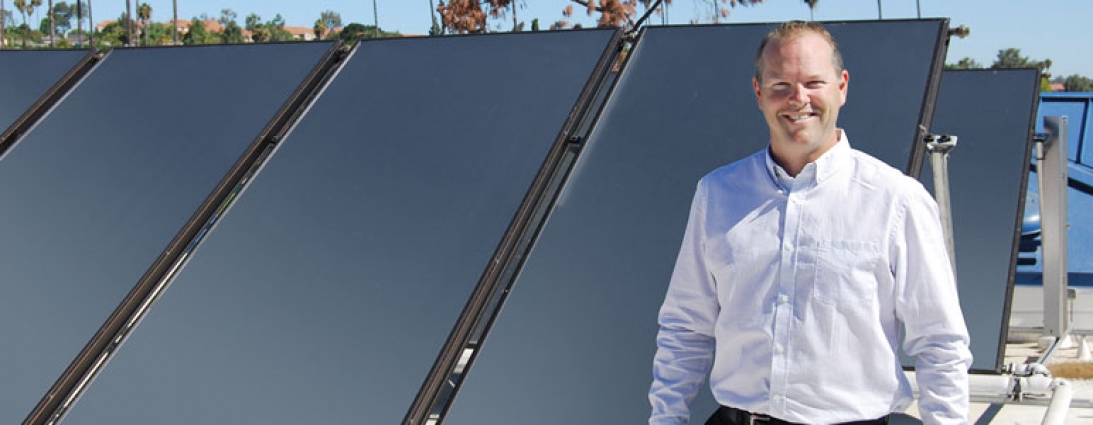

For San Diego hospitality entrepreneur Brett Miller, who acquires, upgrades and operates boutique hotels, restaurants and recreational properties, being green is simply the right thing to do, but if he can be green and get a good return on investment, it’s even better.
Originally published in the San Diego Business Journal August 2014 edition of “Sustainable San Diego.”
While undertaking a $17 million renovation of the once-elegant Quails Inn at Lake San Marcos into the Lakehouse Hotel & Resort, Miller looked for ways to overcome some energy and water issues that he had no control over. High on his list were guests taking long, hot showers and using tons of towels and linens.
“In the hospitality business, you can’t ask your guests to forgo their comfort and personal choices for using less power and water, but you can choose sustainable systems that lower utility expenses,” said Miller, the CEO of Eat.Drink.Sleep. (EDS). “You have to be savvy enough to make the right choices and willing to make capital expenditures to save money monthly.”
Solar water heating opportunity
In the hotel industry, water heating is the largest single end use for energy, making up almost a third of total energy use. Hot water may be free to guests, but hotel managers know that every bath, shower, kitchen and laundry counts toward their ever-increasing utility bill.
Miller said hot water needs at Lakehouse during high occupancy run about 6,000 gallons per day for guest rooms and an additional 4,000-6,000 gallons for laundry facilities. “That’s a lot of 60-gallon home hot water tanks” he joked.
As for costs, Miller noted the hotel was spending about $6,000 a month for natural gas, much of it for heating water. “Natural gas prices are relatively low today, but it’s incredibly unpredictable what rates may become over the 20- to 25-year operation of a water heating system,” Miller explained. “For a hotel, solar makes so much sense given the amount of hot water needed.”
Breaking down the numbers
Miller turned to Simon Reeves of Reeves Mechanical of Temecula, California, general contractors for the overall Lakehouse renovation to price a solar water heating system as part of the hotel’s eight-month remodel. The project came to about $118,000 for three systems serving different sections of the resort with 32-collectors feeding a total of 2,050 gallons to the storage tanks.
That seemed pricy until rebates from the California Solar Initiative (CSI) – Thermal Program cut costs nearly in half to about $62,300 based on the system’s projected long-term energy savings. The system also qualified for the 30 percent federal investment tax credit for renewable energy and accelerated depreciation allowances. The final out-of-pocket cost was about $43,600. Currently, Miller reports about a 75 percent savings on natural gas bills and projects a six-year return on the solar water heating investment.
“We wouldn’t have done it without the rebates,” Miller said. “Installing solar water heating is going to save us a lot of money over the long run, well beyond the payback – and we can feel better about reduced environmental impacts.”
The Lakehouse solar water heating system will save nearly 3,900 therms (390 million BTUs) of natural gas yearly, resulting in more than 22 tons of greenhouse gases offset by the system each year. Over the lifetime of the system, this is the equivalent to carbon sequestered by 424 acres of forest over one year or GHG emissions reductions equivalent to removing 109 cars from the road.
For all types of businesses
Almost every business uses hot water, whether it’s for hand sinks and showers or high-volume commercial dishwashers, heavy-duty laundries or industrial processes. A solar water heating system can displace much of the natural gas or electricity used for commercial water heating and helps achieve profitable and sustainable operations. Virtually any business with a need for hot water and a roof exposed to the sun can take advantage of solar water heating.
CSE administers the CSI-Thermal Program in the SDG&E territory and has extensive information online about solar water heating and rebates including a listing of local contractors eligible for the program. While the center does not endorse any specific contractor, all participating contractors must abide by strict program standards. There are also tips and best practices for hiring a contractor. Unless it’s a self-installation, the contractor will handle the rebate processing.
Rebates are also available for solar thermal systems for process heat, solar cooling, space heating and combination systems. Beginning this year, rebates were added for swimming pool solar heating systems at commercial, multifamily, government, nonprofit or institutional properties.
“When you look at the numbers, you’ll want to do solar water heating because energy prices are only going to go up,” Miller said. “Sometimes the most efficient equipment is the most expensive but with the rebates and other financial incentives, you get the best systems for less than the least expensive ones.”
Visit the CSE website tor complete information on commercial solar water heating opportunities and rebates or contact Sarah Smith, CSI-Thermal Program manager, at (858) 634-4739.
Ideal Businesses for Solar Water Heating
- Laundry facilities
- Restaurants and cafeterias
- Fitness centers and spas
- Hotels and lodging
- Water amusement parks
- Wineries and breweries
- Process heat for food
- Process heat for industry
